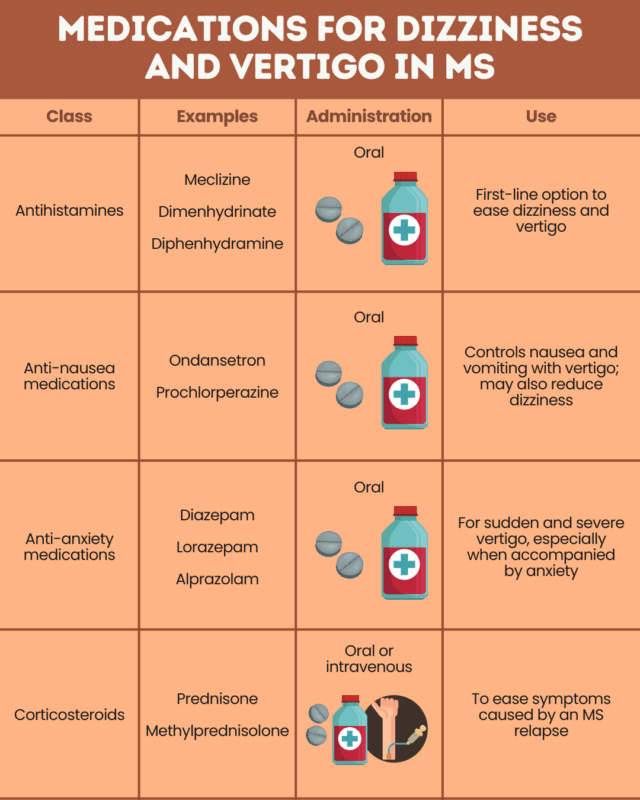Dizziness and vertigo in multiple sclerosis
Some people with multiple sclerosis (MS) may experience dizziness or vertigo, two related sensations that can make a person feel lightheaded, unsteady, or off-balance. These common symptoms can affect mobility, increase the risk of falls, and interfere with daily activities.
MS is a neurodegenerative disease in which the immune system erroneously attacks healthy parts of the brain and spinal cord, leading to a wide range of symptoms. Damage in brain regions involved in balance, coordination, and spatial orientation can lead to dizziness and vertigo in MS.
Although these symptoms of MS can make it more difficult to perform day-to-day activities, several medications and interventions are available to help manage them.
What are dizziness and vertigo?
Dizziness and vertigo are two relatively common symptoms that can be experienced in MS.
- Dizziness is an umbrella term that covers a range of abnormal sensations, such as feeling faint, lightheaded, unstable, or off-balance.
- Vertigo is a specific type of dizziness characterized by an intense spinning sensation, as if the person or the room around them is moving, even while still. It often causes nausea and vomiting and can also lead to balance and vision problems, lightheadedness, and motion sickness.
Although their exact prevalence is not definitively established, dizziness is estimated to affect 50%-60% of patients at some point in their disease course, while about 20%-30% may experience vertigo.
Dizziness vs. vertigo: Understanding your MS symptom
While closely related, dizziness and vertigo are not interchangeable.
If a person feels unsteady, lightheaded, or like they are going to faint, it’s likely dizziness. If they feel that they or the environment is moving, tilting, or spinning, especially with nausea, it’s likely vertigo.
Dizziness and vertigo in MS are frequently caused by damage to brain regions responsible for controlling balance. However, the treatment for the two can differ, so it’s important to accurately distinguish them.
Dizziness and vertigo in MS versus other diseases
Dizziness and vertigo are not unique to MS and can occur for many other reasons, including medications, dehydration, infections, low blood pressure or blood sugar, or other neurological disorders.
When these symptoms are caused by MS, they are central in origin, meaning they arise from problems within the central nervous system, specifically the brain and spinal cord. They can also occur with conditions such as stroke, brain tumors, or bleeding.
Other conditions generally cause what’s known as peripheral vertigo/dizziness. This arises from problems in the inner ear, which plays an important role in balance and spatial orientation.
One of the most common causes of vertigo in the general population is called benign paroxysmal positional vertigo, an inner ear disorder that causes brief, sudden episodes of dizziness or a spinning sensation triggered by a change in head position.
Importantly, while dizziness and vertigo can be caused by MS-related damage, lightheadedness in MS can also occur due to causes unrelated to MS. Physicians must carefully assess symptoms to identify the true cause before deciding on treatment.
How are dizziness and vertigo treated?
MS-related dizziness and vertigo may resolve on their own, but treatment can help when symptoms persist or interfere with daily functioning. Management typically involves a combination of medications and physical therapy.
Medications
To ease acute symptoms, a doctor may recommend certain medications, such as:
- antihistamines for motion sickness
- anti-nausea medications
- anti-anxiety medications
These medications act as vestibular suppressants, decreasing neuronal activity in the vestibular system, or the brain’s balance center, to temporarily alleviate symptoms of vertigo and dizziness.
Dizziness and vertigo can happen during an MS relapse, where new inflammatory activity in the brain leads to new or worsening MS symptoms. In severe cases, a healthcare provider may prescribe a short course of corticosteroids, such as prednisone or methylprednisolone, which help ease the inflammation that’s driving the relapse.

Physical therapy
Many people with dizziness and vertigo may also benefit from targeted physical therapy. A therapist can identify positions or movements that trigger or worsen dizziness, and help patients build up a tolerance to those positions.
A specialized form of physical therapy known as vestibular rehabilitation, which utilizes exercises focused on improving balance and eye control to manage dizziness, may be beneficial for some MS patients.
Multiple Sclerosis News Today is strictly a news and information website about the disease. It does not provide medical advice, diagnosis, or treatment. This content is not intended to be a substitute for professional medical advice, diagnosis, or treatment. Always seek the advice of your physician or other qualified health provider with any questions you may have regarding a medical condition. Never disregard professional medical advice or delay in seeking it because of something you have read on this website.
 Fact-checked by
Fact-checked by 

